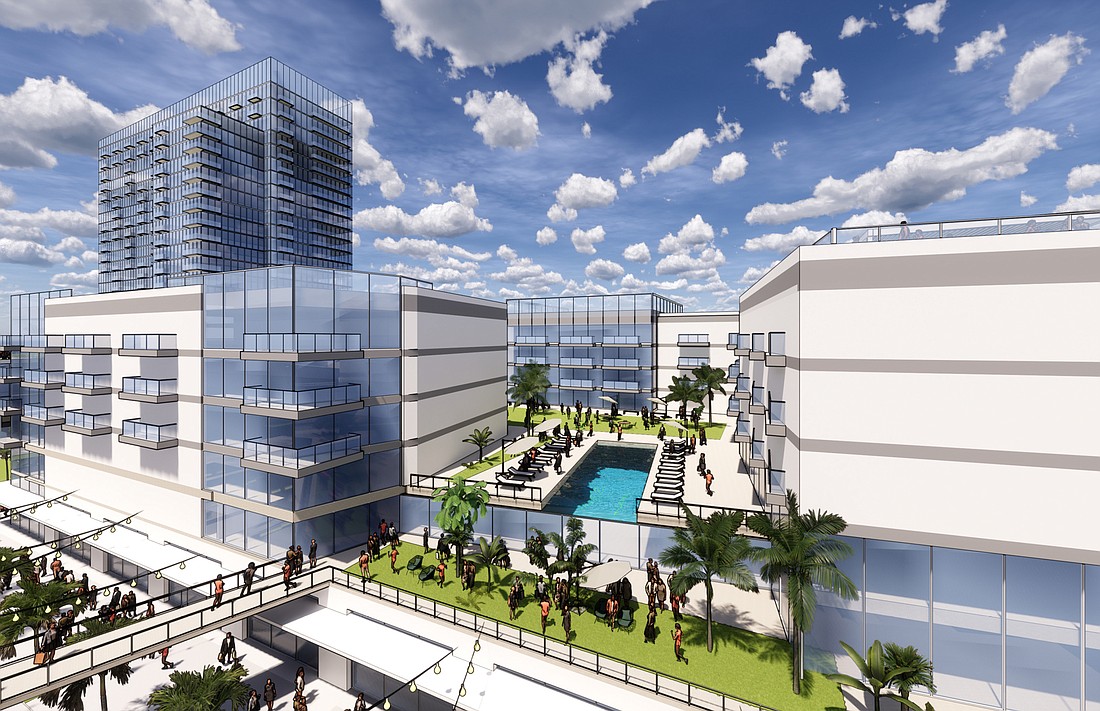
The city’s proposed $218 incentives package for the Jacksonville Jaguars and its project partners to develop Lot J includes a $65.5 million, interest-free loan that would be repaid after 50 years.
The loan is part of the city’s incentives offer for the proposed $445 million mixed-use project west of TIAA Bank Field, the Jaguars’ home stadium.
City spokesperson Nikki Kimbleton said in an email Oct. 6 that the loan would be repaid through growth on a $13.1 million trust funded by the developer. The city cannot touch the trust earnings until the account reaches $65.5 million or after 50 years.
“The Collateral for the loan is held in a trust and invested, and the City takes title to the corpus of the trust at the earlier of the time the corpus equals ($)65.5 (million) plus trust expenses, or 50 years,” said Kimbleton, city director of public affairs, in the email.
The loan structure wasn’t included in the term sheet released to local media after the Oct. 5 news conference with Jaguars owner Shad Khan, team President Mark Lamping and Mayor Lenny Curry.
The financing option is called a “Breadbox loan” in the term sheet. The financing structure was created in response to the 2017 Tax Act that eliminated the use of nontaxable economic development grants by government entities, according to St. Louis-based UTW Capital LLC that promotes the program.
Curry released a preliminary term sheet with the Jaguars and its development partner, The Cordish Companies, in August 2019 that listed the $65.5 million incentive as a grant.
City Chief Administrative Officer Brian Hughes led the administration’s negotiating team that brokered the deal with the Jaguars and Cordish.
He did not respond to a request for comment on the loan Oct. 6 and if either party used UTW Capital’s program as a model.
Baltimore, Maryland-based Cordish and Jaguars subsidiary Gecko Investments LLC are equal partners in the Lot J project, operating as Jacksonville I-C Parcel One Holding Company LLC.
A Jaguars spokesperson provided a breakdown Oct. 6 showing which party will pay for each Lot J component, outlining a $445 million development investment.
Curry and promotion material for the project shown Oct 5 said Lot J would be a $450 million project.
The development comprises two residential buildings with a total of 400 for-lease residences; a 150- to 200-room hotel; 75,000 square feet of street-level retail space; 40,000 square feet of class A office space; and a 100,000-square-foot Live! entertainment center with bars, restaurants and indoor and outdoor facilities.
Cordish and the Jaguars would invest $226.8 million. According to the breakdown, the two residential mid-rise buildings and hotel will be privately owned valued at $229.5 million. The Live! District, loan trust and infrastructure would total $190.8 million and be owned by the city.
The Jaguars and Cordish expect development expenses to be $24.7 million, according to the document.
The latest term sheet reduces the city’s infrastructure investment from $92.8 million to $77.5 million, citing a reduction in parking from the 2019 preliminary deal.
Details in the term sheet leave room for the city’s infrastructure cost to increase to $92.8 million if the developer decides to build another parking structure instead of the planned 750-space surface parking lot.
That would bring the deal nearly in-line with the $233 million taxpayer investment Curry proposed last year.
Another scenario could increase the city’s infrastructure payment if environmental mitigation at Lot J, particularly on the surface lot construction, exceeds estimates.
“The current investment of $77.5 million in infrastructure is based on information regarding the level of environmental contamination, the subsurface conditions, the requirements with respect to building on the stormwater retention pond site, and the engineering relating to accommodating the existing guide wire,” the term sheet states.
“To the extent that factors outside of the developers control impact, these portions of the project infrastructure costs related to these portions of the project to exceed current estimates, the city agrees to allocate up to no more than $15.1 million from the investment reduction to cover unanticipated costs.”
The remaining pieces of the Curry administration’s proposed list of taxpayer-back incentives include a no more than $25 million in grants and completion payments for the hotel and residential developments and no more than $50 million for the Live! District.
Legislation containing the deal will have to be filed and approved by City Council.